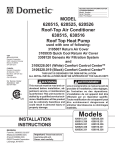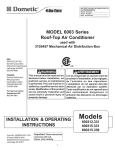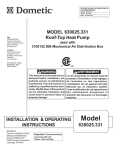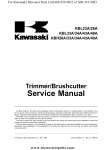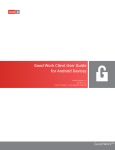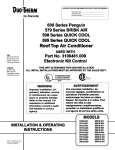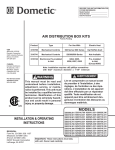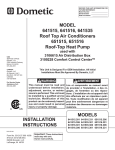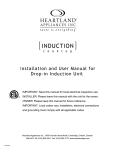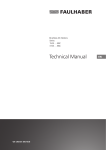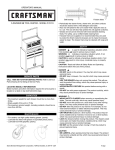Download Dometic 620515.326 Specifications
Transcript
RECORD THIS INFORMATION FOR FUTURE REFERENCE BEFORE INSTALLING THE UNIT: Model Number Serial Number Date Purchased Place of Purchase MODEL 620515, 620525, 620526 Roof Top Air Conditioner & 630515, 630516 Roof Top Heat Pump USED WITH 3106615 Air Distribution Box Kit and TM 3109228.001 Duo-Therm Comfort Control Center USA SERVICE OFFICE Dometic Corporation 509 South Poplar Street LaGrange, IN 46761 260-463-4858 CANADA Dometic Distribution 866 Langs Drive Cambridge, Ontario CANADA N3H 2N7 (519) 653-4390 For Service Center Assistance Call: 800-544-4881 This Unit Is Designed For OEM Installation. All Initial Installations Must Be Approved By Dometic Corporation C US This manual must be read and understood before installation, adjustment, service, or maintenance is performed. This unit must be installed by a qualified service technician. Modification of this product can be extremely hazardous and could result in personal injury or property damage. Lire et comprendre ce manuel avant de procéder à l'installation, à des réglages, de l'entretien ou des réparations. L'installation de cet appareil doit être effectuée par un réparateur qualifié. Toute modification de cet appareil peut être extrêmement dangereuse et entraîner des blessures ou dommages matériels. MODELS INSTALLATION INSTRUCTIONS REVISION Form No. 3109529.069 1/04 (Replaces 3109529.051) (French 3109604.060) ©2004 Dometic Corporation LaGrange, IN 46761 Important: These Instructions must stay with unit. Owner read carefully. 1 620515.321 620515.326 620515.421 620525.321 620525.326 620525.421 620526.321 620526.326 630515.321 630515.326 630515.421 630516.321 630516.326 620515, 620525, 620526, 630515 & 630516 Installation Instructions GENERAL INFORMATION SAFETY INSTRUCTIONS A. Product features or specifications as described or illustrated are subject to change without notice. This manual has safety information and instructions to help users eliminate or reduce the risk of accidents and injuries. B. This Air Conditioner Is Designed For: 1. Installation on a recreational vehicle during the time the vehicle is manufactured. 2. Mounting on the roof of a recreational vehicle. 3. Roof construction with rafters/joists on minimum of 16 inch centers. 4. Minimum of 2.00 inches and maximum of 4.00 inches distance between roof to ceiling of recreational vehicle. Alternate installation methods will allow forroofs more than 4.00 inches thick. RECOGNIZE SAFETY INFORMATION ! C. The ability of the air conditioner to maintain the desired inside temperature depends on the heat gain of the RV. Some preventative measures taken by the occupants of the RV can reduce the heat gain and improve the performance of the air conditioner. During extremely high outdoor temperatures, the heat gain of the vehicle may be reduced by: 1. Parking the RV in a shaded area 2. Using window shades (blinds and/or curtains) 3. Keeping windows and doors shut or minimizing usage 4. Avoiding the use of heat producing appliances This is the safety-alert symbol. When you see this symbol in this manual, be alert to the potential for personal injury. Follow recommended precautions and safe operating instructions. UNDERSTAND SIGNAL WORDS Operation on High Fan/Cooling mode will give optimum or maximum efficiency in high humidity or high outside temperatures. A signal word , WARNING OR CAUTION is used with the safety-alert symbol. They give the level of risk for potential injury. Starting the air conditioner early in the morning and giving it a "head start" on the expected high outdoor ambient will greatly improve its ability to maintain the desired indoor temperature. ! WARNING indicates a potentially hazardous situation which, if not avoided, could result in death or serious injury. For a more permanent solution to high heat gain, accessories like A&E outdoor patio and window awnings will reduce heat gain by removing the direct sun. They also add a nice area to enjoy company during the cool of the evening. ! CAUTION indicates a potentially hazardous situation which, if not avoided may result in minor or moderate injury. D. Condensation Note: The manufacturer of this air conditioner will not be responsible for damage caused by condensed moisture on ceilings or other surfaces. Air contains moisture and this moisture tends to condense on cold surfaces. When air enters the RV, condensed moisture may appear on the ceiling, windows, metal parts, etc. The air conditioner removes this moisture from the air during normal operation. Keeping doors and windows closed when this air conditioner is in operation will minimize condensed moisture on cold surfaces. CAUTION used without the safety alert symbol indicates, a potentially hazardous situation which, if not avoided may result in property damage. Read and follow all safety information and instructions. 2 620515, 620525, 620526, 630515 & 630516 Installation Instructions SPECIFICATIONS MODEL NUMBER Nominal Capacity (BTU/HR) * Electrical Rating Compressor Rated Load Amps Fan Motor Rated Load Amps Compressor Locked Rotor Amps Fan Motor Locked Rotor Amps SCFM - High Speed Max./Min. Refrigerant (R22) oz. Minimum Wire Size ** AC Circuit Protection (User Supplied) DC Circuit Protection (User Supplied) Installed Weight (Pounds) Minimum Generator 1 UNIT Size *** 2 UNITS * ** *** 620515.321 620526.321 620515.326 620526.326 620515.421 620525.421 13,500 620525.321 630516.321 620525.326 630516.326 13,500 15,000 115 VAC, 60 Hz., 1 PH. 11.5 12.4 12.0 3.1 3.1 3.3 50.0 60.0 64.0 8.8 8.8 8.5 335/250 380/250 17 15.5 21.5 12 AWG Copper up to 24 ft. 20 Amp Time Delay Fuse or HACR Circuit Breaker Installation must comply with all National, State, Province and/or Local Electrical Codes 102 102 104 3.5 KW 5.0 KW 630515.421 13,500 12.0 3.1 50.0 8.8 630515.321 630515.326 13,500 19.5 12.4 3.1 60.0 8.8 335/250 24.5 102 102 Maximum unit performance achieved at full rated voltage. For lengths over 24 ft., consult the National Electrical Code. Dometic Corporation gives general guidelines for generator requirements. These guidelines come from experiences people have had in actual applications. When sizing the generator, the total power usage of your recreational vehicle must be considered. Also keep in mind generators lose power at high altitudes and from lack of maintenance. INSTALLATION INSTRUCTIONS B. Choosing Proper Location For The Air Conditioner A. Precautions This air conditioner is specifically designed for installation on the roof of a recreational vehicle (RV). When determining your cooling requirements, the following should be considered: • Size of RV; • Window area (increases heat gain); • Amount of insulation in walls and roof; • Geographical location where the RV will be used; • Personal comfort level required. 1. Normal Location-The air conditioner is designed to fit over an existing roof vent opening. When the vent is removed, it normally creates a 14-1/4" X 14-1/4" Improper installation may damage equipment/ could endanger life, cause serious injury and/ or property damage. 1. Read Installation and Operating Instructions carefully before attempting to start your air conditioner installation. 2. Dometic Corporation will not be liable for any damages or injury incurred due to failure in following these instructions. 3. Installation must comply with the National Electrical Code ANSI/NFPA-70 and CSA Standard C22.1 (latest edition and any State or Local Codes or regulations. 4. DO NOT add any devices or accessories to this air conditioner except those specifically authorized by Dometic. 5. This equipment must be serviced by qualified personnel and some states require these people to be licensed. (±1/8") opening. FIG. 1 Roof Vent Opening 2. Other Locations-When no roof vent is available or another location is desired, the following is recommended: a. For one unit installation: The air conditioner should be mounted slightly forward of center (front to back) and centered from side to side. 3 620515, 620525, 620526, 630515 & 630516 Installation Instructions b. For two unit installations: Install one Air Conditioner 1/3 and one Air Conditioner 2/3’s from front of RV and centered from side to side. FIG. 2 1/2 L FIG. 4 4" 7-1/8” 4-1/8” L 2/3 L L 4" 21-3/8” 1/3 L 14-1/4" x 14-1/4” (±1/8”) OPENING REAR OF UNIT Center Line of Unit 7-1/8” KEEP THESE AREAS FREE OF OBSTRUCTIONS It is preferred that the air conditioner be installed in a relatively flat and level roof section measured with the RV parked on a level surface. Note: A 8° slant to either side, or front to back, is acceptable for 620515, 620525, 620526, 630515 and 630516 series. 12" + -1/8 2 7/8 3. After Location Has Been Selected: a. Check for obstructions in the area where air conditioner will be installed. See FIG. 3 & 4. b. The roof must be designed to support 130 poundswhen the RV is in motion. Normally a 200 lb. static load design will meet this requirement. 4 4 2 7/8 CAUTION It is the responsibility of the installer of this air conditioner system to ensure structural integrity of the RV roof. Never create a low spot on the roof where water will collect. Water standing around the air conditioner may leak into the interior causing damage to the product and the RV. C. Roof Preparation 1. Opening Requirements - Before preparing the ceiling opening, the type of system options must be decided upon. If a remote sensor is to be used, provision must be made for it. If the load shed option is to be used, wires must be run from the load shed control to the Dometic A/C. If a furnace is to be connected, wires must be run from the furnace to the Dometic A/C. Read all of the following instructions before beginning the installation. If a roof vent opening will not be used a 14-1/4" x 141/4" (±1/8") opening must be cut through the roof and ceiling of the RV. This opening must be located between the roof reinforcing members. c. Check inside the RV for air box obstructions (i.e. door openings, room dividers, curtains, ceiling fixtures, etc.) See FIG. 3 & 4. FIG. 3 9-1/2" 9-1/2" 28-3/4" There may be electrical wiring between the roof and the ceiling. Disconnect 115 volt AC power cord and the positive (+) 12 volt DC terminal at the supply battery. Failure to follow this instruction may create a shock hazard causing death or severe personal injury. 39" 28-3/4" 39" 20" 2-1/2" 22" 4 620515, 620525, 620526, 630515 & 630516 Installation Instructions The 14-1/4" x 14-1/4" (±1/8") opening is part of the return air system of the Air Conditioner and must be finished in accordance with NFPA Standard 501C Section 2.7.2. 2. Roof Vent Removal a. Unscrew and remove the roof vent. b. Remove all caulking compound around opening. CAUTION It is the responsibility of the installer of this air conditioner system to ensure structural integrity of the RV roof. Never create a low spot on the roof where water will collect. Water standing around the air conditioner may leak into the interior causing damage to the product and the RV. FIG. 5 D. Wiring Requirements 1. Route a copper 12 AWG, with ground, 115 VAC supply line from the fuse or circuit breaker box to the roof opening. a. This supply line must be located in the front portion of the 14-1/4" x 14-1/4" (±1/8") opening. b. The power MUST be on a separate 20 amp time delay fuse or HACR circuit breaker. c. Make sure that at least 15" of supply wire extends into the roof opening. This ensures easy connection at the junction box. d. Wiring must comply with all National, State and Local Wiring Codes. e. Use a steel sleeve and a grommet or equivalent methods to protect the wire where it passes into the opening. 2. Route a dedicated 12 VDC supply line (18-22 AWG) from the RV's converter or battery to the roof opening. a. This supply line must be located in the front portion of the 14-1/4" x 14-1/4" (±1/8") opening. b. Make sure that at least 15" of supply wire extends into the roof opening. c. In a multiple zone installation, this wiring is required in only one of the 14-1/4" x 141/4" (±1/8") openings. 3. If a Remote Temperature Sensor is used, the connector end must be routed to the roof opening of the system which it will control. Make sure that at least 15" of the sensor cable extends into the roof opening. Refer to the Remote Sensor Instructions for details of the installation. 4. If a furnace is to be controlled by the system, the two furnace thermostat leads must be routed to the roof opening of the air conditioner that will control it. Make sure that at least 15" of the furnace thermostat wires extend into the roof opening. 5. If an Energy Management System (load shed feature) is to be used with the control, two wires must be routed to the roof opening of the zone to be managed. The signal required for this function is normally open relay contact. When the EMS calls for the compressor to shut off, the relay contacts should close. Make sure at least 15" of the EMS wires extend into the roof opening. c. Seal all screw holes and seams where the roof gasket is located. Use a good grade of all weather sealant. d. If the opening exceeds 14-3/8" x 14-3/8", it will be necessary to install spacers. e. If the opening is less than 14-1/8" x 14-1/8", it must be enlarged. 3. New Opening-(Installation Other Than Vent Opening) a. Mark a 14-1/4" x 14-1/4" (±1/8") square on the roof and carefully cut the opening. b. Using the roof opening as a guide, cut the matching hole in the ceiling. d. The opening created must be framed to provide adequate support and prevent air from being drawn from the roof cavity. Lumber 3/4" or more in thickness must be used. Remember to provide an entrance hole for power supplies, furnace wiring, 4-conductor control cable, remote sensor and load shed (Energy Management System) options as desired. FIG. 6 Do Not Cut Roof Structure Or Rafters Good-Rafters Supported By Cross Beams 3/4" Min. Leave Access for Power Supply Wiring Good LocationBetween Roof Rafters Frame Opening So It Won't Collapse When Bolting Down 15" min. 5 620515, 620525, 620526, 630515 & 630516 Installation Instructions 6. Route a 4-conductor control cable from the Comfort Control Center™ mounting position into the 14-1/4" x 14-1/4" (±1/8") roof opening. Make sure that at least 15" of the wire extends into the roof opening and 6" extend from the wall at the mounting position of the Comfort Control Center™. See Section E-2. 7. In the event that other Air Conditioners are installed (additional zones) an additional 4-conductor control cable must be routed to the other Air Conditioners. Make sure that at least 15" of the wire extends into the roof opening. See FIG. 21. 8. If an automatic generator start kit (AGS) will be installed, a 4-conducter control cable must be routed from the last air conditioner to location of AGS kit. Follow AGS kit instructions for installation. c. The control cable must be terminated with two (2) RJ-11 telephone connectors. Refer to the crimp tool manufacture for crimping instructions. Important: RJ-11 connectors must be installed as shown in FIG. 7A & 7C. FIG. 7A FIG. 7B E. Dometic Comfort Control Center™ & Cable Installation FIG. 7C 1. Location a. If the system is to be used WITHOUT a Remote Temperature Sensor, the proper location of the Comfort Control Center™ is very important to ensure that it will provide a comfortable RV temperature. Observe the following rules when selecting a location: • Locate the Comfort Control Center™ 54" above the floor. • Install the Comfort Control Center™ on a partition, not on an outside wall. • NEVER expose it to direct heat from lamps, sun or other heat producing items. • Avoid locations close to doors that lead outside, windows or adjoining outside walls. • Avoid locations close to supply registers and the air from them. b. If the system is to be used WITH a Remote Temperature Sensor in ALL zones, the Comfort Control CenterTM may be mounted anywhere that is convenient in the coach. Try to avoid hard to reach and hard to see areas. • Refer to the instructions provided with the Remote Temperature Sensor for details of installation. c. A 3/8" diameter hole will be needed to route the cable through the wall. See Section D-3. 2. Control Cable Installation A 4-conductor control cable must be routed from the roof opening to the Comfort Control CenterTM. a. Choose the shortest, most direct route from the 14-1/4" x 14-1/4" (±1/8") opening to the Comfort Control CenterTM location selected. Leave 6" of cable extending through the wall. See Section D-6. b. The control cable that should be used is a flat, 4-conductor telephone cable. Pin 1 RJ-11 Connector Flat Four Conductor Cable 3. Comfort Control CenterTM Installation a. Carefully remove the base plate from the Comfort Control CenterTM. This may be accomplished by inserting a small screwdriver under the tab on the bottom edge of the front cover and gently prying. See FIG. 8. FIG. 8 MO DE N FA P TEM UP DO WN ZO NE OF F ON Insert Screwdriver under Tab b. Insert the control cable through the hole in the base plate and mount the plate to the wall with two (2) screws provided. Check the alignment to ensure level installation. c. Install the control cable RJ-11 connector into the back of the Comfort Control Center™ and gently press onto the base plate. 6 620515, 620525, 620526, 630515 & 630516 Installation Instructions F. Placing the Air Conditioner On The Roof FIG. 11 1. Remove the air conditioner from the carton and discard carton. 2. Place the air conditioner on the roof. UPPER DUCT FIG. 9 SIDE W ITHOUT TAB T O R EAR OF A PPLIANCE LOWER R DUCT c. Remove the upper duct from the ceiling template and locate it over the blower discharge. Note: The edge without the flange installs toward the rear of the RV. d. Use two (2) #10 x 3/8" screws to hold the duct to the base pan. The holes are pre-punched in the pan for each location. e. Check gasket alignment over roof opening and adjust if necessary. Unit may be moved from below by slightly lifting. See FIG. 12. This unit weighs approximately 100 pounds. To prevent back injury, use a mechanical hoist to place Air Conditioner on roof. 3. Lift and place the unit over the prepared opening using the gasket on the unit as a guide. CAUTION FIG. 12 Center Unit From Below Do not slide the unit. This may damage the neoprene gasket attached to the bottom and may create a leaky installation. FIG. 10 FRONT Roof Gasket f. Reach up into the return air opening and pull the electrical cord down. g. Mount the junction box to the ceiling in the following location. See FIG. 13. • Locate the junction box near ceiling template. Locate opposite discharge duct end and on same side as discharge duct. See FIG. 14 • Center long side of junction box on center of mounting bolt. • Place edge of box approximately 1/2" from edge of ceiling template. • Attach junction box to ceiling of coach using two (2) #10 x 1/2" screws provided. 4. Place the Air Box Kit inside the RV. This box contains mounting hardware for the air conditioner and will be used inside the RV. This completes the outside work. Minor adjustments can be done from the inside of the RV if required. G. Installing The Air Conditioner 1. Discharge Duct & Ceiling Template Installation. a. Remove the air box and mounting hardware from their carton. The upper duct is shipped inside the lower duct which is part of the ceiling template. b. Locate the three 8" x 1/4" x 20 unit mounting bolts, junction box cover and Romex connector in the 3107180.006 bolt kit. 7 620515, 620525, 620526, 630515 & 630516 Installation Instructions j. FIG. 13 Take the ceiling template and slide the lower duct over the upper duct. FIG. 16 Gasket Remote Sensor Low Voltage Wires Junction Box Control Cables h. Install the Romex connector in the junction box. k. Hold the ceiling template with one hand and with the other, install the three 1/4" mounting bolts through the template and into the base pan. • Finger-tighten the (3) bolts and check alignment. There should be an equal opening on each side and the rear flange must be tight against the roof opening. • EVENLY tighten the bolts to a torque of 40 to 50 inch pounds. This will compress the roof gasket to approximately 1/2". The bolts are self locking so over tightening is not necessary. Ceiling FIG. 14 Discharge Air Junction Box 14-1/4" x 14-1/4" (±1/8") Junction Air Conditioner CAUTION i FIG. 15 Measure the ceiling thickness: • If the distance is 2" to 3" remove the perforated tabs from the bottom duct only. • If the distance is 3" to 4" install ducts as received. • If the distance is 4" to 6" (maximum thickness), optional Duct and Bolt Kits are available: Duct (Part No. 318556.000) Bolts (Part No. 3100895.006) CENTER A /C FROM BEL OW If bolts are left loose there may not be an adequate roof seal or if over tightened, damage may occur to the air conditioner base or ceiling template. Tighten to torque specifications listed in this manual. H. Wiring Of System Reach up into the return air opening and pull the remaining wires down. See FIG. 13. 1. Connection Of Low Voltage Wires CAUTION GASKET Disconnect the positive (+) 12 volt DC terminal at the supply battery. Damage to equipment could occur if the 12 volt DC is not shut off. a. Route Remote Temperature Sensor cable, if applicable, and attach it to the connector that matches its color protruding from the return air opening. MEASURE CEILING THICKNESS 8 620515, 620525, 620526, 630515 & 630516 Installation Instructions b. Connect the previously run 12 VDC to the red and black wires protruding from the return air opening. (In multiple zone installations, this needs to be doneat only one zone.) Connect +12 VDC to the red wire; –12 VDC to the black wire. c. Connect the previously run furnace thermostat wires (if applicable) to the blue wires protruding from the return air opening. The polarity of these connections does not matter. d. Connect the previously run Energy Management System wires (if applicable) to the yellow wires protruding from the return air opening. The polarity of these connections does not matter. e. Terminate the 4-conductor control cable(s) protruding into the 14-1/4" x 14-1/4" (±1/8") roof opening. The cable(s) must be terminated with a telephone RJ-11 connector. Refer to the crimp tool manufacturer for crimping instructions. Important: RJ-11 connectors must be installed as shown in FIG. 7A & 7C. f. Plug the control cable(s) into the telephone jack(s) protruding from the return air opening. (It does not matter which one.) FIG. 17 Ceiling Template Junction Box Discharge Air Duct 14-1/4" x 14-1/4" (±1/8") Opening Junction Box Cover Air Conditioner Mounting bolts I. Air Box Installation 1. Remove the two filter-grilles from the air box. 2. Slide the air box over the ceiling template. 3. Install the four (4) sharp pointed screws through the air box legs and into the pre-punched holes in ceiling template. Note: There are four optional mounting holes on the outer edge of the return air opening for which no screws are provided. These are only required where an uneven ceiling does not allow proper fitting of the air box. 4. Install the filter-grilles by pushing them into place. See FIG. 18. 2. Connection Of 115 Volt Power Supply FIG. 18 CEILING TEMPLATE CELING T EMPLATE AIR AIR BOX Disconnect 115 volt AC. Failure to follow these instructions could create a shock hazard causing death or severe personal injury. a. Route power supply line through Romex connector and into junction box on side away from the ceiling template. Tighten connector. J. System Configuration, Reset & Check Out This product is equipped with a 3-wire (grounded) system for protection against shock hazard. Make sure that the prduct is wired into a properly grounded 115 volt AC circuit and the polarity is correct. Failure to do so could result in death, personal injury or damage to the equipment. Now that the system is installed, it is necessary to check all operations and then configure the electronics. Refer to the operating manual for a description of the air conditioner operation. 1. Electronic Control Kit Configuration Depending on the equipment options installed by the recreational vehicle manufacturer, the appropriate dip switches will need to be switched to the "ON" position. See FIG. 19. Placing the switch in the "ON" position selects that option. Note: Dip switches are in the "OFF" position when shipped from the factory except for models supplied with the heat strip factory installed, (620515).For this model , the #1 dip switch will be in the "ON" position. To gain access to the dip switches, theshroud must be removed from the unit. Remove the four mounting screws around the perimeter of the unit. Next remove the electrical box cover. (The electrical box will be on the curb side of the RV after installation). b. Connect white to white; black to black; and green to green or bare copper wire using appropriate sized twist connectors. c. Tape the twist wire connectors to the supply wire to assure they don't vibrate off. d. Push the wires into the box. e. Install the cover onto the junction box. 9 620515, 620525, 620526, 630515 & 630516 Installation Instructions a. Zone selection - when two or more units are installed and controlled by one Comfort Control CenterTM, the second unit becomes Zone 2, the third unit Zone 3 and the fourth unit Zone 4. The appropriate zone dip switch must be set in each electronic control kit for Zone 2, 3 and 4. 2. System Reset After setting the dip switches in the electronic control kit, do a system reset. a. Turn the ON/OFF switch to the "OFF" position. b. Simultaneously depress and hold the MODE and ZONE push-buttons while turning the ON/ OFF switch to "ON". FF should appear in LCD display until the mode and zone push-buttons are released. c. When a dip switch is turned on after initial configuration, a system reset will need to be done before the Comfort Control Center™ will recognize the updated selection. 3. System Checkout We recommend that power be supplied to the air conditioner and check for proper operation. Verify that all features of the installed system work. See Comfort Control Center™ Operating Instructions. Check fan speeds, cooling mode, heat pump mode, furnace (if connected) and heat strip. If the features do not work, check all wiring and confirm that the correct options have been selected on the Electronic Control Board. FIG. 19 1 2 3 4 5 6 7 8 ON HEAT STRIP ZONE 2 ZONE 3 ZONE 4 FURNACE DIFFERENTIAL STAGE GEN START DIP SWITCHES b. Heat strip selection - For units with a heat strip installed at the factory (Model 620515), the #1 dip switch will be in the "ON" position. All other models will have the dip switches in the "OFF" position. c. Furnace selection - when a furnace has been connected to a zone, place the furnace dip switch "ON" for that zone. d. Differential - differential is the temperature difference between the "ON/OFF" cycle of the thermostat. The normal differential is preset in the circuit board with the dip switch set to the "OFF" position. In some situations, it may be necessary to decrease the Differential. The location of the thermostat may create a condition where the normal Differential will not maintain your comfort zone. If this occurs, the Differential can be shortened by placing the Differential dip switch to the "ON" position. Note: Setting the Differential dip switch should only be required when installation conditions are less than desirable and is not covered under the limited warranty. e. Stage selection - stage is not used on these units. Leave in the "OFF" position. f. Gen start selection - leave in the "OFF" position. g. Replace the unit electrical box cover. h. Replace the shroud. i. Repeat this procedure for each additional zone. 10 620515, 620525, 620526, 630515 & 630516 Installation Instructions FIG. 20 Air Conditioner Rear Roof Mount Assembly Front Upper Discharge Air Duct Roof Line Roof Reinforcement Member Framing, Return Air Duct 14-1/4" x 14-1/4" (±1/8") Opening Lower Discharge Air Duct (Attached to Ceiling Template) Ceiling Template Unit Mounting Bolts Mounting Legs Mounting Legs Air Box FIG. 21 REAR REMOTE SENSOR (Required with Second Air Conditioner) 115V AC REAR A/C 14-1/4" x 14-1/4" (±1/8”) OPENING 4-CONDUCTOR CONTROL CABLE FURNACE 2 WIRES BREAKER BOX 4-CONDUCTOR CONTROL CABLE OPTIONAL FURNACE DOMETIC COMFORT CONTROL CENTER FURNACE FURNACE 2 WIRES 14-1/4" x 14-1/4" (±1/8”) OPENING OPTIONAL FRONT REMOTE SENSOR 12V DC INPUT 2 WIRES 115V AC FRONT A/C 11 620515, 620525, 620526, 630515 & 630516 Installation Instructions WIRING DIAGRAM FOR MODELS 620515.321, 620515.326, 620515.421, 620525.321, 620525.326, 620525.421, 620526.321 & 620526.326 PASSED DIELECTRIC FREEZE CONTROL FACTORY WIRING SPLICE CAP FIELD WIRING REMOTE SENSOR CABLE BLK RJ-11 CABLE TO COMFORT CONTROL O.L. MOTOR RED BLK WHITE WHITE R BRN BLK P5 P4 FAN C PTCR A/C POWER 3 AMP WHT BLK T5 MODULE FUSE WHT BOARD FURNACE FURNACE 12V 12V + INDICATORS IF USED K1 NO HEATER ELEMENT COM WHT BLK GRN/YEL T1 T3 REMOTE SENSOR CABLE SPLICE CAP WHT BLK A/C POWER MODULE BOARD P3 P4 P5 F1 3 AMP FUSE P2 T5 YEL YEL BLU K6 P1 RED WHT START CAP RED NO O.L. MOTOR R BLK S C BLK BLK WHT BRN BLK RED RUN CAP FAN WHT P3 P4 P5 F1 P2 P1 C PTCR AMBIENT SENSOR 3 AMP FUSE WHT WHT HERM T5 RED WHT START CAP BLK RED P6 BLK LOAD SHED LOAD SHED FURNACE FURNACE 12V 12V + COM REVERSING VALVE BLK YEL YEL K1 BLU NO BLU FIELD WIRING BLK FACTORY WIRING COM REVERSING VALVE BLK SPLICE CAP RED BLK T1 GRN/YEL GRN/YEL T2 WHT BLK 3106613.023 A/C POWER MODULE BOARD C COMPRESSOR GRN/YEL RED WHITE HERM BLK RJ-11 CABLE TO COMFORT CONTROL YEL WHITE FAN WHT COM NO RED RUN CAP WHT BLK T3 BLK WHT BRN BLK FREEZE CONTROL REMOTE SENSOR CABLE C BLK BLK RED S PTCR K1 BLU PASSED DIELECTRIC COMPRESSOR O.L. R AMBIENT SENSOR P6 LOAD SHED LOAD SHED FURNACE FURNACE 12V 12V + BLK CONDUCTORS ONLY WIRING DIAGRAM FOR MODELS LATER VERSION 630515.321, 630515.326 630516.321, 630516.326 BLK MOTOR YEL WHITE 60 Hz, 1O USE COPPER BLK GRN/YEL RED 115 VAC GRN/YEL T2 BLK RJ-11 CABLE TO COMFORT CONTROL MODELS BLK BLK WIRING DIAGRAM FOR MODELS EARLY VERSION 630515.321, 630515.326 630515.421 630516.321, 630516.326 FACTORY WIRING ON SOME LIMIT SWITCH NO 3106682.036 FIELD WIRING NOT USED COM K6 SOLAR OR DIRTY FILTER RED START CAP WHT YEL YEL BLU BLU BLK RED LOAD SHED RED HERM P6 LOAD SHED RED RUN CAP WHT P1 P2 S C WHT YEL BLK BLK P3 F1 COMPRESSOR GRN/YEL BLK SOLAR OR DIRTY FILTER INDICATORS IF USED 115 VAC 60 Hz, 1o USE COPPER CONDUCTORS ONLY K6 COM T1 T3 BLK NO GRN/YEL GRN/YEL T2 WHT BLK BLK 115 VAC 60 Hz, 1o USE COPPER CONDUCTORS ONLY 3106613.049 12












